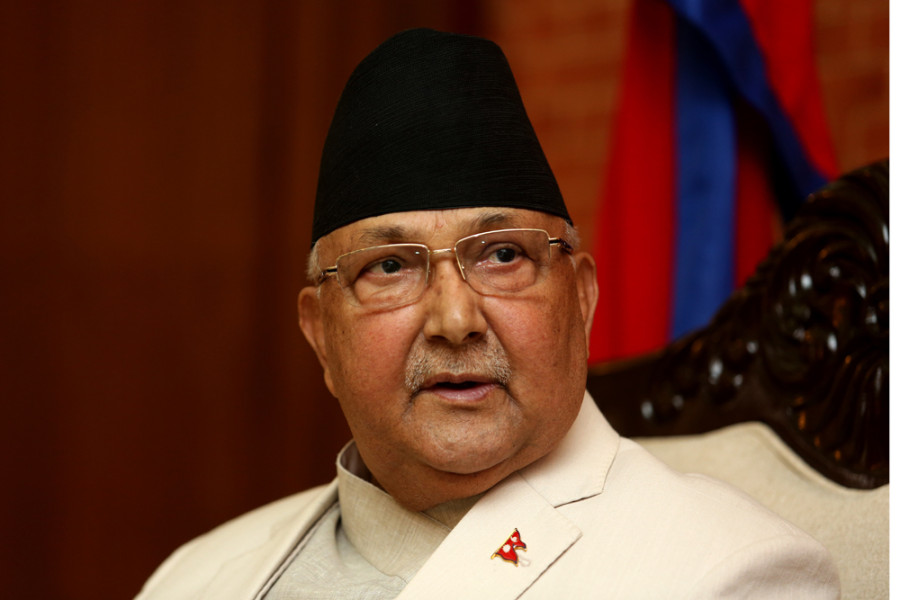Politics
Oli is firm, will not be stepping down any time soon, his aides say
The prime minister will require twice-a-week dialysis or another kidney transplant, both of which could affect governance, but he is determined to see through his accomplishments.
Anil Giri
Over the last two days, with Prime Minister KP Sharma Oli admitted to hospital and little information forthcoming from government officials and doctors, many had begun to wonder if Oli was fit to govern. But after conducting two cycles of hemodialysis on Wednesday and Thursday, Oli exited Grande International Hospital on Thursday with a spring in his step.
Outwardly, Oli shows no signs of being too ill to govern and neither the ruling party nor opposition leaders, citing morals and ethics, have publicly commented on the future course should Oli be unfit. Privately, Oli’s health remains the biggest political and medical concern both within the Nepal Communist Party (NCP) and for those closely following Nepali politics. Leaders express concern about the prime minister’s health and the political course for the Oli government, its power dynamics, and party unification.
[Read: The health of the prime minister is a topic that affects everyone in the country]
Oli’s health has always been a cause for concern, but in recent months, there are fears that things might be getting serious. According to doctors familiar with his medical condition, Oli will undergo a third cycle of dialysis on Saturday and will need regular renal dialysis at least two to three times a week from now on. The prime minister’s residence is mulling over installing a dedicated dialysis machine and other supportive facilities so that Oli will not have to visit the hospital, a Baluwatar source told the Post.
The other option for Oli is to seek another kidney transplant. Oli has been operating with one transplanted kidney ever since both his kidneys failed 12 years ago. Oli’s aides and supporters have already found two people willing to donate one of their kidneys to Oli, according to party leaders.
As both these options come with their own risks and could further ail the prime minister, there are concerns about the country’s leadership. However, Oli’s aides and party leaders close to Oli say that he is determined not to step down.
“He is staying firm and there is no reason he should step down from his power and position at the moment,” said Kundan Aryal, Oli’s press advisor. “The prime minister’s health should not be a pretext for politics.”
Aryal admitted that Oli’s health has gotten worse but also said that he is receiving proper treatment and that Oli can still lead the country.
“Under his leadership, the party gained majority seats and governments were formed at the provinces and the centre. So there is no chance he will quit his post,” said Aryal. “He can always arrange time for the country in between his treatment.”
While many party leaders believe that it is time for Oli to take a call on whether he should rest or continue as prime minister, those who know him well say that Oli is not someone who will easily take a backseat from active politics due to his health.
“Though his health condition has deteriorated, it is up to him to make a decision,” said ruling party leader Ghanshyam Bhusal. “Oli knows how the ties between a political party, society and the nation evolve. There are limitations for every leader. The country’s present achievements were under his leadership so he wants to take them to their logical conclusion.”
Under Oli, the Nepal Communist Party became a behemoth after the unification of Oli’s CPN-UML and Pushpa Kamal Dahal’s Maoists. But the unification process of the two communist parties has yet to be completed, and there are questions about the power dynamics between the ruling party’s two co-chairs, Oli and Dahal.
“It all depends on what Oli wants,” said Surya Thapa, deputy chief of the party’s publicity division and a vocal critic of Dahal. “Oli has strong willpower so he is not going to give up his political ambition so easily.”
According to Thapa, there is still time for Oli to decide, as he could undergo another transplant and recover quickly, like the last time around. And furthermore, there are many leaders who are in worse health than the prime minister, said Thapa.
So far, there has been no discussion within the party regarding a post-Oli ruling party. Most leaders still defer to Oli and his own decision regarding the party and government leadership.
“If the prime minister goes for another kidney transplant, he will have to rest for a minimum of six months,” said party leader Top Bahadur Rayamajhi. “He has to attend public functions but his health may not permit him to do so. In this case, it is up to Oli to take a decision.”
Doctors have advised Oli to refrain from frequent interactions and public functions to avoid the risk of infection. But according to Oli’s aides, once he completes his final round of treatment next week, he will be back to normal.




 13.12°C Kathmandu
13.12°C Kathmandu















